Honors students’ medical futures get a booster shot from local alumni
J.S. Ward Society brings alumni, supporters and students together to hand-off passion for health care to future generations.
By Janel Shoun-Smith | 615-966-7078 |
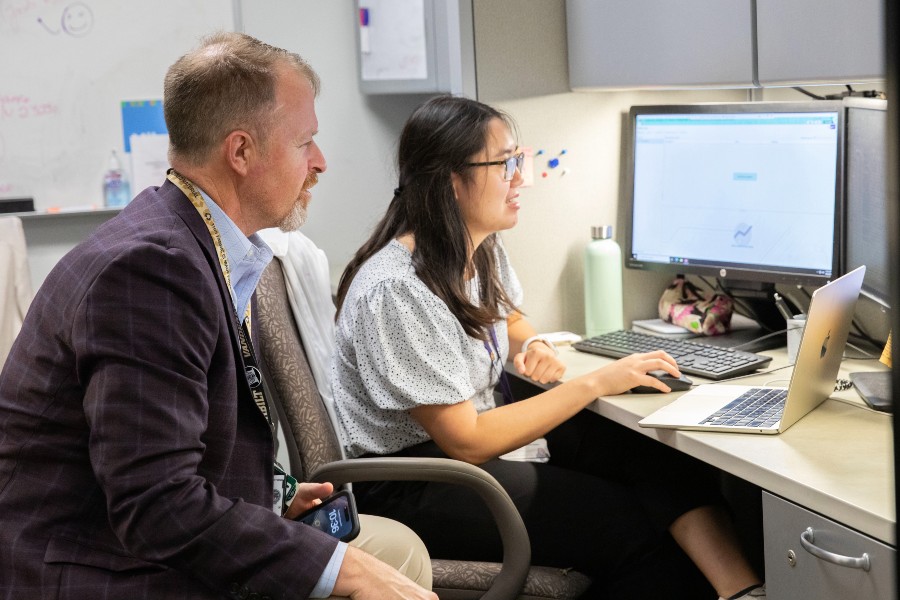
Molecular biology senior Carolyn Tran worked with Dr. Eric Grogan this summer on a database of medical histories from more than 600 patients at Ingram-Vanderbilt Cancer Center.
Few undergraduate students targeting medical school in their future get the opportunity to work hands-on with scientific research before earning their bachelor’s degree. Even fewer still have the opportunity to work on both bench research and clinical research at three different universities before graduating.
That’s the path that senior Honors College student Carolyn Tran, is on thanks to the opportunities brought her way through Lipscomb’s J.S. Ward Society and the College of Liberal Arts & Sciences. But she’s not the only one.
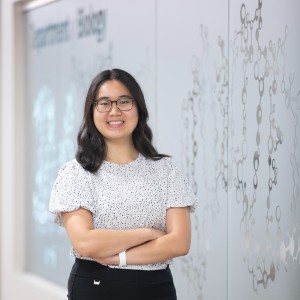
Carolyn Tran
The Ward Society is an alumni affinity group that supports Lipscomb’s health sciences programs and the university’s students to help enter medicine, dentistry, pharmacy and many other allied health professions. The society has awarded various student scholarships and research fellowship opportunities since 2016.
In the past few years, the new Bison Docs mentoring program has been established along with a physician-in-residence lecture series and coordination of in-home small group gatherings, all in an effort to remove the barriers to excellent students’ gaining acceptance into medical school and entering the health care profession.
Tran, a molecular biology major from Nashville, has also had the opportunity to be mentored by local radiation oncologist Dr. Daniel Wakefield (BS ’12) and shadowed other physicians. Her experiences have led to her volunteering at a free clinic while working alongside Vanderbilt University medical students and presenting three academic presentations at Lipscomb’s Student Scholars Symposium (so far).
She will graduate from Lipscomb in May 2025 having carried out research that hopefully leads to less toxic chemotherapy drugs (with Lipscomb’s Josh Owens (BS ’16), assistant professor of biology), a better understanding of the causes of African sleeping sickness (with Dr. Minu Chaudhuri at Meharry Medical School) and a better way to diagnose lung cancer (with Dr. Eric Grogan (BS ’95) at Vanderbilt University Medical Center).
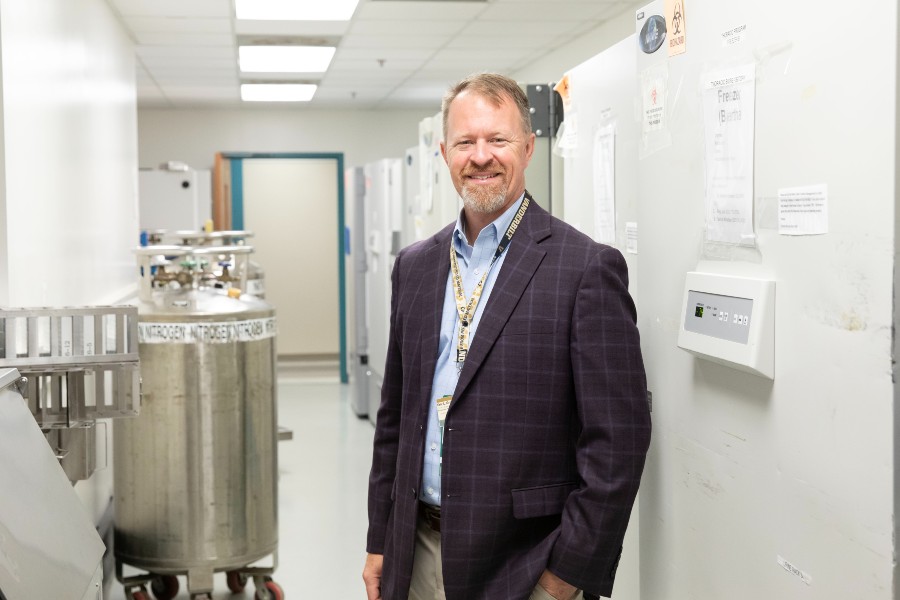
Dr. Eric Grogan pictured in the lab’s bio bank, a repository of frozen blood and tissue samples from hundreds of lung cancer patients, to be used to develop easier diagnosis and treatment.
“Undergraduate research which is a highly transformative and impactful educational practice,” said Florah Mhlanga, interim vice provost and executive director of the Ward Society. “Our pre-health students gain valuable success skills that enable them to flourish in their academic areas and also to be readily admitted into professional schools.”
Research fellowships have proven so valuable for Lipscomb students eyeing a medical career, that in 2024 the society shifted funds for scholarships to provide more summer research fellowships, said Mhlanga. Ten undergraduate students spent this summer conducting research one-on-one with faculty at Meharry Medical School, Vanderbilt University and Lipscomb.
According to Tran, “I’ve been able to get a broader insight on different specialties and understand why each mentor wanted to practice in their respective fields. I appreciate the research experiences… as they have helped me think more like a scientist and network with amazing professionals in the health care field.”
Grogan, who hosted Tran this summer as one of numerous Ward fellows and other Lipscomb interns over the years, sees mentoring the next generation as crucial to his mission in medicine: developing an earlier and less invasive detection method for the most common cancer in the world: lung cancer.
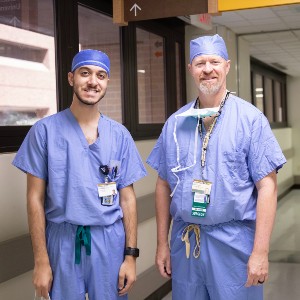
Timothy Khalil and Dr. Grogan
“Even if I don’t solve any major problems in my lifetime, if I can just help the next generation of major scientists to be able to solve them, for me, that is worth it,” said Grogan, associate professor of surgery and vice chair of research at the Vanderbilt University Medical Center’s Department of Thoracic Surgery.
Timothy Khalil (BS ’23), a 2023 Ward Scholar and Fellow and an Honors College alumnus, is now working full-time in Grogan’s lab, the MASLAB at the Vanderbilt-Ingram Cancer Center, as a clinical/translational research coordinator.
During his gap year before heading to medical school, Khalil is busy preparing and cataloging blood and tissue samples from lung cancer patients to include in the lab’s biorepository, a collection of frozen samples and corresponding data.
Vanderbilt researchers, and others all over the world, can pull from this data to work on developing a blood test and clinical calculator to determine if a patient has lung cancer. Tran has been working this summer on confirming and cataloging the medical histories from more than 600 patients stored in the bank’s database.
Dr. Scott Guthrie (BA ’95), a specialist in neonatal-perinatal medicine, professor at Vanderbilt, and chair of pediatrics at the Ayers Children’s Medical Center at Jackson-Madison County General Hospital in Jackson, Tennessee, took Lipscomb Ward Fellow Kaylee Wu (BS ’23), a biology graduate and Honors College alumna from Oregon now at Wake Forest Medical School, on a global research trip to India to prepare doctors in five hospitals for a clinical trial of a new technique to treat respiratory distress syndrome in premature infants in summer 2022.
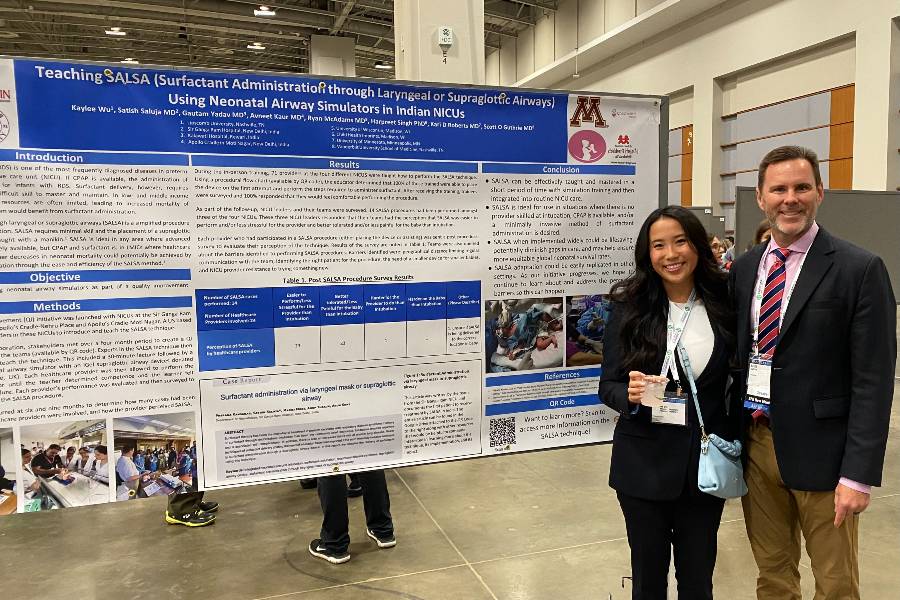
Guthrie mentored Kaylee Wu to prepare a presentation on the India research at the 2023 Pediatric Academic Societies Meeting, attended by more than 8,000 pediatricians from around the world, in Washington D.C.
As a clinical research assistant, Wu helped prepare physicians on how to perform the new technique and explained its data and proven effectiveness. Later Wu analyzed videos of the doctors performing the procedure to assess the patients’ pain level.
“I learned so much from the brightest doctors,” said Wu of the trip. “In addition to the clinical research, I observed the collaboration process and learned the nuances of adjusting to cultural differences in a professional setting. I learned how to participate in global health meetings and how to talk to doctors from other countries.”
Wu had extensive experience traveling internationally with her parents, who are from China and Indonesia. Those adventures developed in her an enthusiasm for learning from new people and new experiences, she said.

Harpeet Singh, Scott Guthrie, Kaylee Wu and Ryan McAdams
“It’s fun to be able to influence the next generation and to see them get the opportunities and tools to succeed,” said Guthrie, a U.S. Fulbright Scholar Specialist who has traveled to Azerbaijan at the request of their government to teach neonatology and improve outcomes.
Guthrie also took Wu along to make a presentation about the India clinical project to the 2023 Pediatric Society Meeting in Washington D.C., a very unusual opportunity for an undergraduate, he said.
“It was a lot of fun to help Kaylee through the research process and to get her to the point where she can present at an international meeting like PAS,” said Guthrie. “That’s part of what I like about mentoring. To get students excited about a career in medicine, and to maybe give them an idea they may not have thought about before. I don’t think global health was on Kaylee’s radar, but now she is enrolled in Wake’s Global Health Certificate Program while she is working on her MD.”
“It is satisfying to see someone grow, develop, mature and expand their horizons,” he said.
Wakefield and Grogan are just two of the local physicians who have donated their time to provide summer research fellowships as well as speaking with students on campus, inviting them into their homes, allowing them to shadow them at work or mentoring them one-on-one throughout a semester.
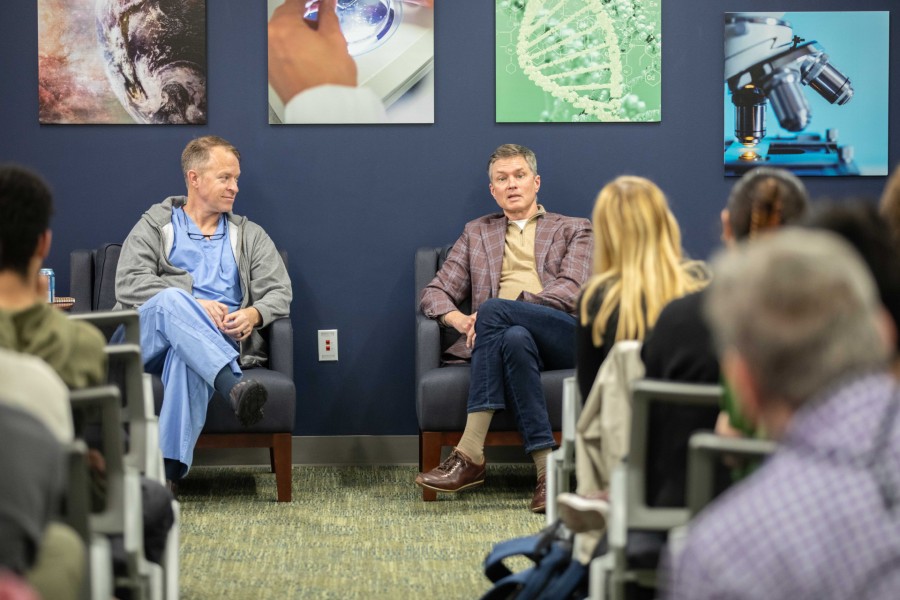
One of the new Ward programs established in the past few years is the physician-in-residence lecture series. Here Dr. Eric Grogan and Dr. James Loden, owner of Loden Vision Centers, and both alumni, speak to students in the McClure Center.
The Bison Docs mentoring program pairs pre-professional students entering their junior year with Ward Society members who are eager to serve as professional mentors throughout the semester, said Mhlanga.
“These mentors assist students in gaining invaluable clinical hours and, in key cities, may also serve as interview hosts,” she said. “The program has been highly successful, providing students with experiences that deepen their understanding of their chosen professions. Through this program, students gain first-hand experience in what it means to be an ethical and compassionate healthcare provider.”
As a woman in the health care industry, Johnetta Blakely (BA ’94), a medical oncologist and executive vice president of quality and clinic operations at Tennessee Oncology, has a passion for nurturing female health care providers and leaders. She specifically invited her mentee, Leah Jacob, a biochemistry and molecular biology major and Honors College student, to an event highlighting issues concerning women in oncology.
“It bothers me that women seem to think that if they have a family, they can’t be a doctor,” said Blakely. “It’s just not true.”
Blakely has two grown daughters and a spouse, Martin Blakely, who is also a doctor, a pediatric surgeon at Vanderbilt University Medical Center. Both of her daughters consider their family unit to be “tight-knit,” and both are highly independent, world-savvy individuals due to their upbringing, said Blakely.
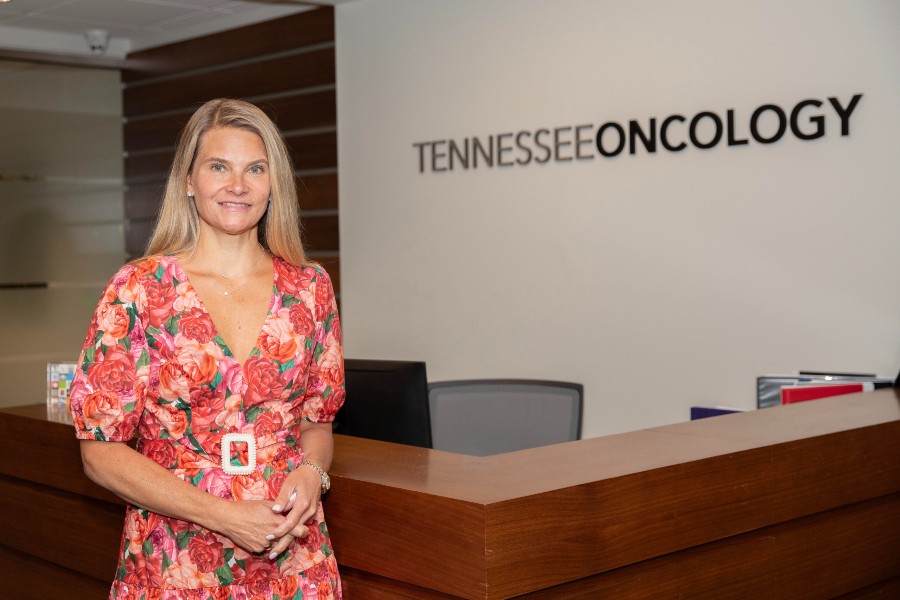
Johnetta Blakely, a medical oncologist invited her mentee to an event highlighting issues concerning women in oncology.
Blakely knows working women face hard choices; she herself set aside research in place of strictly seeing patients when moving back to Nashville for the benefit of her family, but “it’s a misconception that if a woman works, she will completely miss the life of her child,” she said.
Wakefield, a radiation oncologist with Tennessee Oncology, said he had a summer internship in college and now wants to pay that experience forward. As a Bison Doc mentor he has had students shadow him during his clinic duties.
“I think any exposure is really world-shaping but specifically seeing oncology patients is really intense and complicated,” he said of students’ shadowing experience. “The experience sticks with them for a long time. I try to show the students a really humanistic way to work with people, and whether they go into health care or not, they benefit because a life of service is a life well-lived.”
“He is a mentor that makes me excited to be a clinician in the future,” said Tran of her Bison Docs experience with Wakefield. “ Oncology is a sensitive specialty and observing how he communicates with his patients and their families about a delicate topic was an invaluable experience to observe and learn from.”
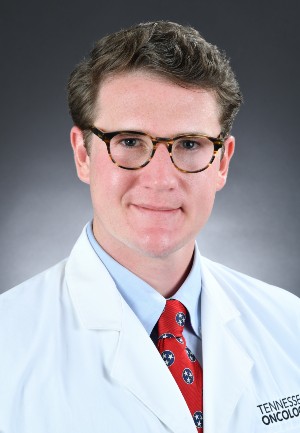
Dr. Daniel Wakefield
In addition to preparing for a future in medicine (and perhaps motivated by her experience with the Ward Society), Tran is also using her time at Lipscomb to help pass on her love of science to the next generation.
Inspired by her own life-changing experience as a third-grader at a STEM summer camp called Camp Invention, Tran and a group of her fellow science majors established a school club, Beyond the Basics, two years ago devoted to holding STEM-focused fun events for schools around the Metro Nashville district. The students themselves come up with hands-on projects and have held school-wide events at schools such as Carter-Lawrence Elementary, Eakin Elementary and J.T. Moore Middle School.
Tran’s club, Beyond the Basics, is just another way the Ward Society is instilling a passion for health care to future generations.
“I think the Ward Society is creating a very personal network of people with similar mindsets, and Lipscomb is setting them up for success of generational hand-off of wisdom and advice,” said Wakefield. “It is meaningful to pay forward what I was given from professors such as Alan Bradshaw, Jon Lowrance (BS ’77), Phil Choate (BA ’69), Kent Gallaher (BS ’91) and Jim Arnett (BA ’67).”